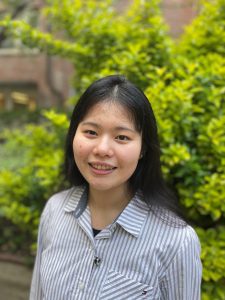This is part of a series of posts by recipients of the 2021 Career Services Summer Funding Grant. We’ve asked funding recipients to reflect on their summer experiences and talk about the industries in which they spent their summer. You can read the entire series here.
This entry is by Hong Yu Liu, COL ’24
 I had the opportunity to work in the Shin Lab at the Perelman School of Medicine for a few months this summer. This particular research lab focuses on host-pathogen interactions and uncover how the host uses the innate immune system to defend itself against bacterial pathogens. Likewise the lab also works to understand how the bacteria in turn evade host immunity which leads to disease. The primary model system that the Shin Lab works with is Legionella pneumophila, which is the etiological agent for Legionnaires disease. However, several of the graduate candidates and postdocs work with other pathogens such as Salmonella and Yersinia, all with a focus on uncovering the mechanisms of the innate immune response.
I had the opportunity to work in the Shin Lab at the Perelman School of Medicine for a few months this summer. This particular research lab focuses on host-pathogen interactions and uncover how the host uses the innate immune system to defend itself against bacterial pathogens. Likewise the lab also works to understand how the bacteria in turn evade host immunity which leads to disease. The primary model system that the Shin Lab works with is Legionella pneumophila, which is the etiological agent for Legionnaires disease. However, several of the graduate candidates and postdocs work with other pathogens such as Salmonella and Yersinia, all with a focus on uncovering the mechanisms of the innate immune response.
I came into the lab with no prior research experience but that didn’t deter me from trying to absorb as much knowledge as I could during the summer months. I was able to work with a group of incredibly intelligent and innovative scientists. They were also very welcoming mentors who didn’t see my lack of experience as a weakness. In particular, my main mentor played a large role in creating a very positive experience as I navigate the start of my career as a scientist.
Over the course of three months I was able to add many things to my repertoire of scientific skills and techniques. I have heard of ELISAs and Western blots in my biology laboratory courses, but it was only when I joined the Shin Lab that I truly understood the rationale behind when and why we used these techniques. Beyond the heavy experimental work, I read many research papers so that I not only was up to date with all that was happening within the field of immunology but also learned how to better read and understand research papers. At the beginning it was intimidating because there were many technical terms that I wasn’t familiar with and there were many texts that were dense and difficult to understand. However, I’m glad I had the chance to read so many papers because I realized how important it is to effectively communicate science with readers.
Another aspect of my research experience that I really enjoyed was how transparent my PI was in terms of running a lab. I had only thought about the technical and experimental aspects of research, but it was my PI that opened my eyes to the costs of and the behind the scenes of operating a lab. I didn’t realize just how much pressure PIs in the medical school are under to earn their own salary through grants and how stressful it is to account for all the costs associated with the lab.
Overall, I had a very positive experience in the Shin Lab. Over the course of three months, I transformed from a rookie who had never even used a multi-channel pipette to a more adept scientist able to run her own experiments. By the end of the summer, I was able to present my data and findings in front of the whole lab. I plan on continuing to work in the Shin Lab and hope to continue to grow as a scientist.




